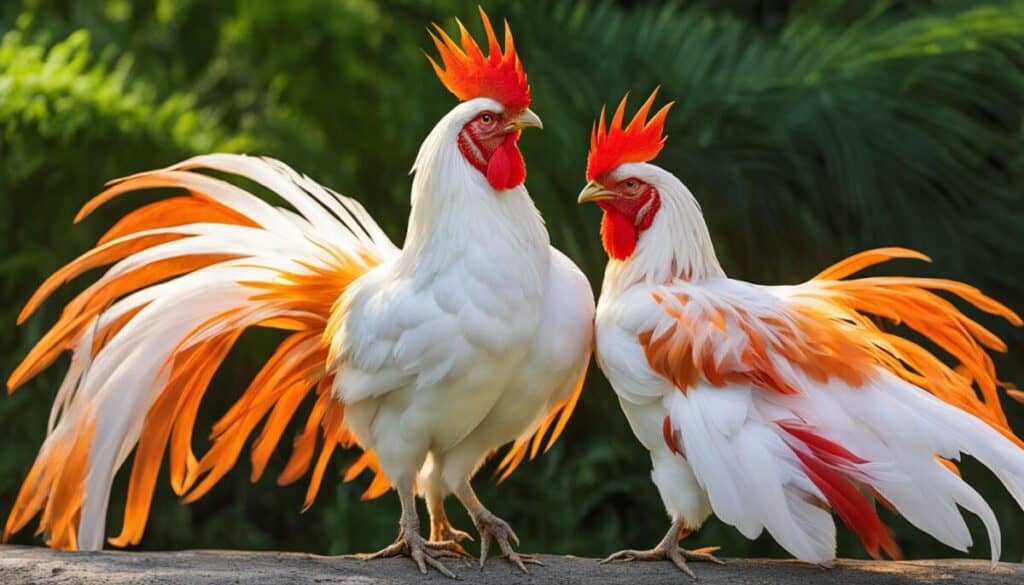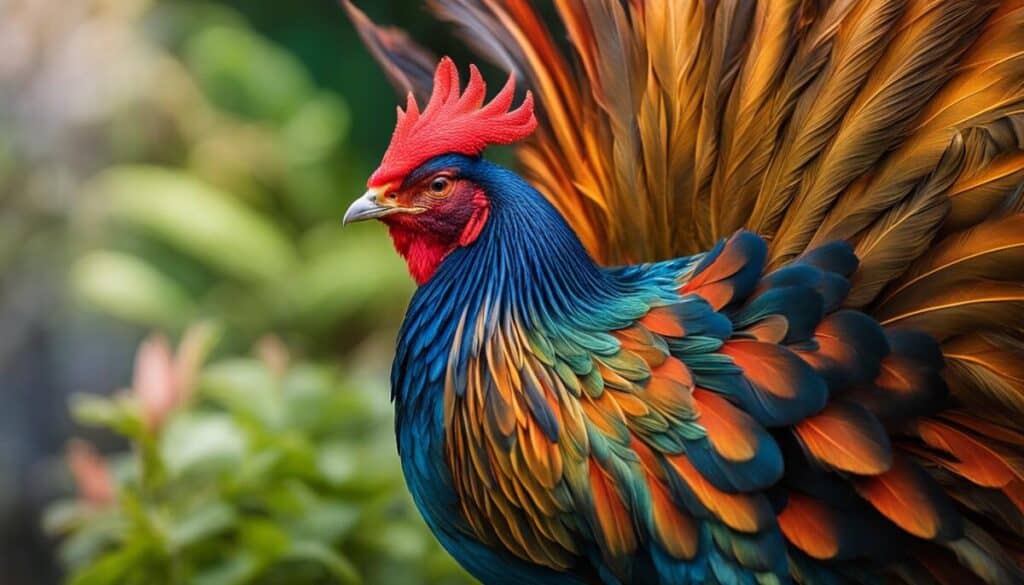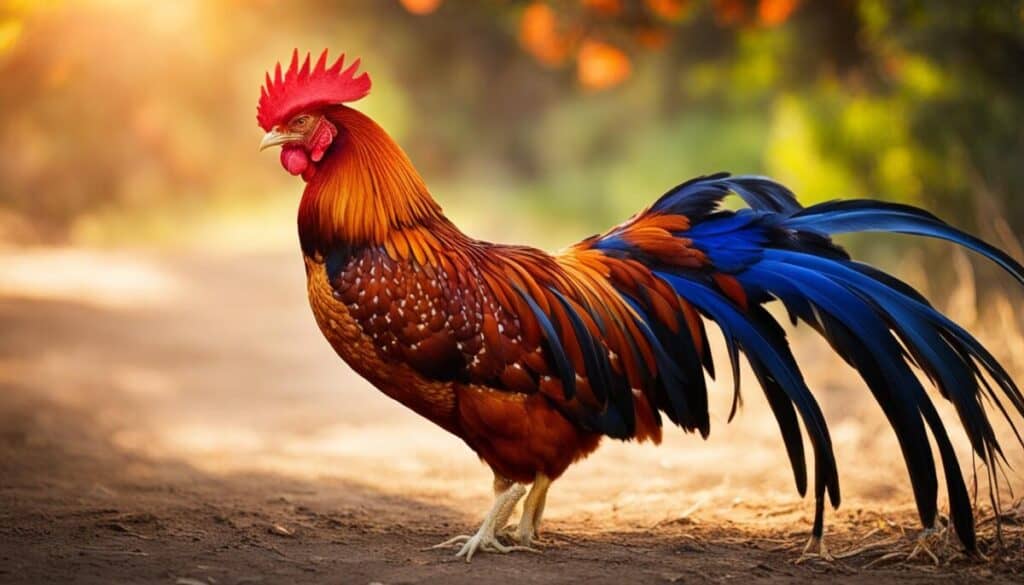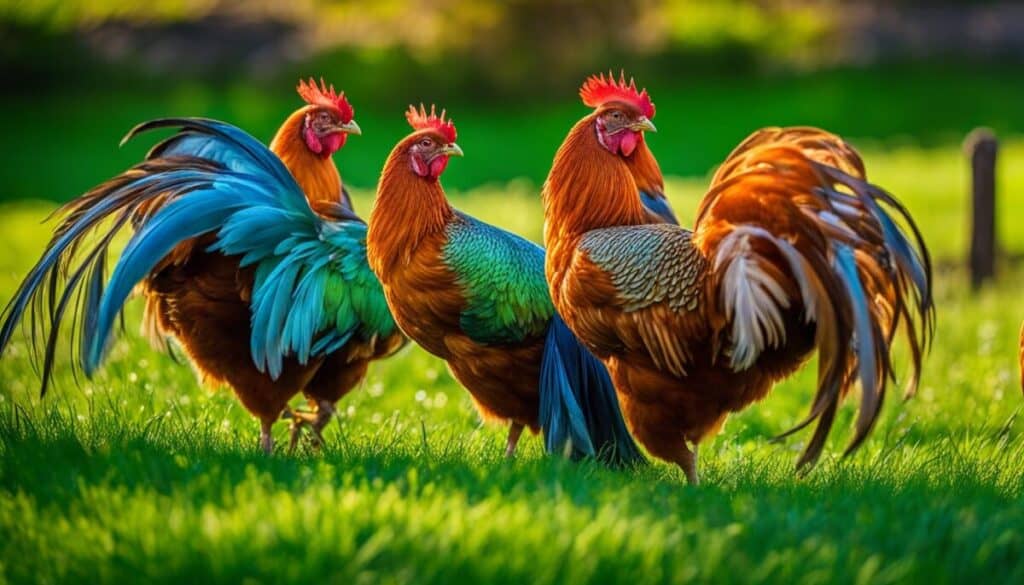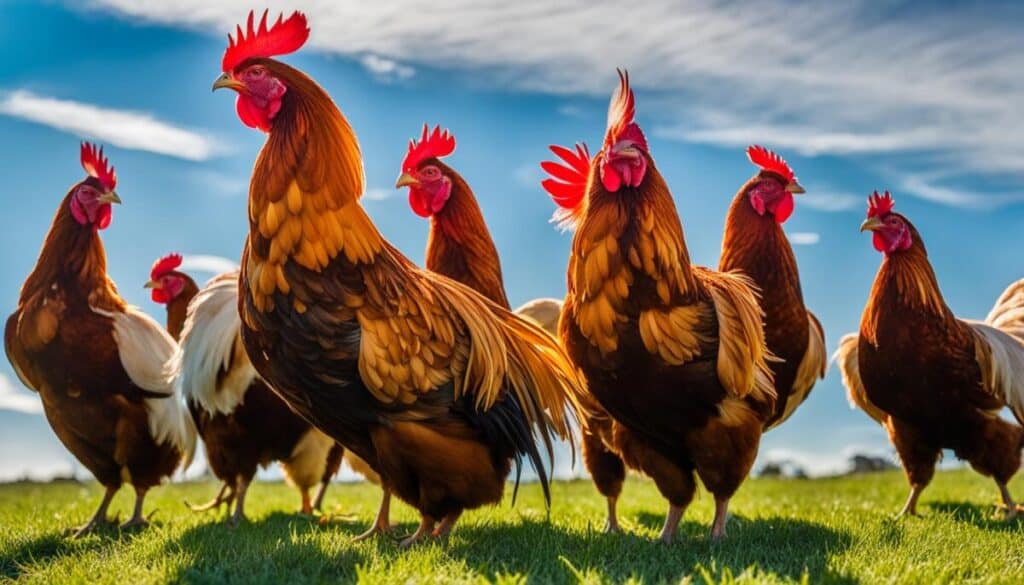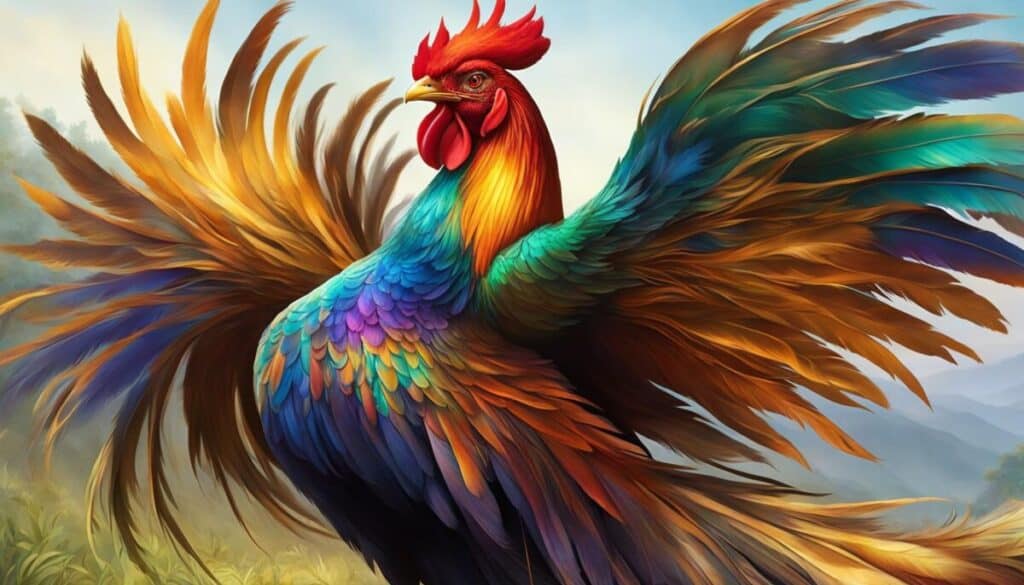If you’re a backyard chicken enthusiast seeking an ornamental addition to your flock, look no further than the Phoenix chicken breed. Known for its exotic elegance, Phoenix chickens are highly sought after by poultry breeders and enthusiasts alike.
These rare chicken breeds originated in Germany and are recognized for their stunning plumage. Their unique appearance, combined with their friendly nature, make them a popular choice for those looking for both beauty and personality in their chickens.
In this article, we’ll delve into the history, characteristics, and care of Phoenix chickens, as well as their appeal to exotic poultry enthusiasts and backyard chicken breeders.
Key Takeaways:
- Phoenix chickens are highly sought after by backyard chicken breeders for their exotic elegance.
- These rare chicken breeds originated in Germany and are known for their stunning plumage and friendly nature.
- Phoenix chickens are popular among exotic poultry enthusiasts and backyard chicken breeders for their unique appearance and personality.
- This article will explore the history, characteristics, and care of Phoenix chickens, as well as their appeal to chicken enthusiasts.
- Keep reading to learn more about the captivating Phoenix chicken breed.
The History and Origins of the Phoenix Chicken Breed
Like many other breeds of poultry, the precise origin of Phoenix chickens is shrouded in mystery. It is believed that this rare chicken breed was first developed in Japan, where it was known as the Onagadori. However, some experts believe that the breed was influenced by birds from Southeast Asia and Europe as well.
Phoenix chickens are known for their strikingly long tails, which can measure up to 8 feet in length. These unique plumage features have been carefully selected by breeders over the centuries to create the ornamental elegance for which these birds are renowned.
Today, Phoenix chickens are primarily bred for their visual appeal rather than their utility. However, they are still raised for egg-laying and meat production, albeit on a smaller scale than other breeds.
The Unique Characteristics of Phoenix Chickens
One of the defining traits of the Phoenix chicken breed is their long feathers, which are notably thinner than those of other breeds. This is due to careful selective breeding, which has resulted in a lighter plumage that limits the bird’s ability to fly. Unlike many other breeds, which feature rounded feathers, those of Phoenix chickens are thin, tapered, and straight. This gives their tails a striking appearance, particularly when in motion.
Phoenix chickens are typically smaller than other breeds, with hens weighing around 4 pounds and roosters weighing around 5 to 6 pounds. They are active and intelligent birds, known for their stunning displays during mating rituals.
Despite their delicate appearance, Phoenix chickens are known for being hardy and disease-resistant. They can adapt to a variety of environmental conditions, which has contributed to their popularity among backyard chicken breeders.
“Phoenix chickens are a prized breed favored by both novice and experienced chicken keepers, thanks to their distinctive appearance and charming personalities.”
The Status of Phoenix Chickens Today
While they were once considered rare, Phoenix chickens have become more readily available in recent years. They are still relatively uncommon, however, which has contributed to their status as an exotic breed favored by ornamental poultry enthusiasts.
Phoenix chickens are now recognized by both the American Poultry Association and the Poultry Club of Great Britain. They are bred in a range of colors, including black, white, silver, and gold.
If you’re interested in adding Phoenix chickens to your backyard flock, it’s essential to do your research and locate reputable breeders who prioritize the health and welfare of their birds. With their ornamental elegance and unique qualities, these rare chicken breeds make a stunning addition to any poultry collection.
Distinctive Features of Phoenix Chickens
Phoenix chickens are a unique and intriguing breed, known for their striking appearance. The Phoenix rooster boasts long and flowing tail feathers, often reaching up to six feet in length. These beautiful feathers are typically black or red and are an iconic characteristic of the Phoenix breed.
The Phoenix hen also has long and flowing tail feathers, although not as long as the rooster’s. The hen’s feathers are typically brown or gold and add to their ornamental look. Phoenix hens are known for their excellent egg-laying abilities, producing around 150-200 eggs per year.
Phoenix chickens are primarily raised for their ornamental value, making them a popular choice for backyard chicken breeds and exotic poultry enthusiasts. Their unique appearance and distinctive features add a touch of elegance and sophistication to any flock.
Physical Traits of Phoenix Chickens
Phoenix chickens are medium-sized breeds, weighing between 4-6 pounds. They have red earlobes and bright yellow feet, along with strong and sturdy bodies. Their tails are long and flowing, adding to their ornamental elegance. These distinctive features make Phoenix chickens highly sought after among exotic poultry lovers and backyard chicken breeders.
The Appeal of Ornamental Chickens
In recent years, raising ornamental chickens has become increasingly popular among backyard chicken breeders. Not only do these birds add aesthetic value to a flock, but they also come in a wide variety of colors and patterns, making them an excellent choice for exotic poultry enthusiasts.
Ornamental chickens first gained popularity in the 1800s as a status symbol among the wealthy, with breeds like the Phoenix and the Silkie prized for their beauty and unique traits. Today, these birds are widely regarded as a favorite among backyard chicken breeds, with their ornamental elegance and charming personalities.
“Ornamental chickens are a delight to watch and add a unique touch of charm to any backyard flock.” – Mary Smith, backyard chicken breeder.
What sets ornamental chickens apart from other poultry breeds is their unique appearance and often quirky personalities. From the feathery “pantaloons” of the Silkie to the impressive tail feathers of the Phoenix rooster, these birds are sure to turn heads and impress visitors.
Exotic Poultry Enthusiasts
For those interested in raising and showing rare chicken breeds, ornamental chickens offer an exciting challenge. With such a wide variety of colors and patterns available, there is always something new to discover and showcase. Plus, the recognition these birds receive as rare and unique breeds adds to their appeal among exotic poultry enthusiasts.
Phoenix Chicken Breed Standards and Varieties
When it comes to selecting the best Phoenix chicken breeds, reputable breeders focus on specific traits that meet the official Phoenix chicken breed standards. These standards ensure continuity across the breed, preserving the unique physical attributes that make them highly sought after.
There are two recognized varieties of the Phoenix chicken breed:
| Variety | Appearance | Color |
|---|---|---|
| Onagadori | Long, flowing tail feathers | Black-breasted Red, White, Silver, Golden, Black, Blue, Splash |
| Yokohama | Long, narrow body with striking color patterns | Red Shoulder, White, Black, Blue Red Shoulder, Silver Duckwing, Black Breasted Red, Black |
Phoenix chickens are known for their ornamental elegance, with long, flowing tail feathers, and striking colors. They require special attention and are a unique addition to any backyard flock.
Caring for Phoenix Chickens in Backyards
Phoenix chickens are beautiful, unique birds that require specific care and maintenance to thrive in backyard settings. Here are some essential tips and guidelines to ensure their well-being:
Housing Requirements
Phoenix chickens enjoy ample space to roam and scratch, so a coop measuring at least 4 square feet per bird is recommended. It’s essential to provide suitable ventilation to prevent respiratory issues, and a clean, dry living area is crucial.
Tip: Make sure the coop is predator-proof by securing fencing and the coop’s base to prevent unwelcome guests from endangering your flock.
Feeding Habits
Phoenix chickens require a balanced and varied diet to maintain their health and energy levels. A combination of quality commercial feed and fresh greens and fruits is recommended. Provide clean water at all times, changing it regularly to prevent contamination.
Overall Maintenance
Regularly inspect your Phoenix chickens for signs of illness or health issues, and address any concerns promptly. Keep the coop clean and well-maintained, providing daily fresh bedding and cleaning food and water dishes. Take special care during winter months, and provide additional warmth and insulation to protect your flock.
Summary
Caring for Phoenix chickens in backyard settings requires attention to detail and a commitment to providing a safe and suitable living environment. With proper housing, feeding, and maintenance, these birds can thrive and bring ornamental elegance to your backyard flock.
Breeding and Incubating Phoenix Chickens
Phoenix chicken breeders play a crucial role in maintaining the beauty and quality of these unique ornamental Japenese chickens. Breeding Phoenix chickens requires dedication, knowledge, and attention to detail. Successful breeding practices ensure the preservation of rare chicken breeds for future generations of exotic poultry enthusiasts to enjoy.
Before starting the breeding process, it’s essential to have a suitable breeding pair. Phoenix chickens reach sexual maturity at around six months old. As with any breeding program, it’s important to consider the lineage of the birds and the traits they carry. Reputable Phoenix chicken breeders prioritize breeding for strong genes, health, and physical attributes as well as the ornamental elegance of the breed.
One aspect of breeding Phoenix chickens is natural mating. Although it seems straightforward, Phoenix roosters can be aggressive towards hens, leading to injuries and sometimes, death. The breeder should observe the birds closely and remove the rooster if the aggression is excessive.
Another method is artificial insemination, which demands precision and practice. A sterile environment is essential when performing this process to avoid infections. Insemination should only be done by professionals or people with extensive training in this field.
Incubating Phoenix Eggs
After breeding, incubation is the next step in hatching Phoenix chicken chicks. The eggs take around 18 – 20 days to hatch, depending on temperature and humidity. Phoenix chicken hens can incubate their eggs on their own, or breeders can use an incubator to simulate natural conditions.
The incubator should maintain a temperature between 99.5 – 100 Fahrenheit and humidity around 55%. The eggs should be rotated multiple times a day to avoid damage or abnormalities during development. Successfully incubating Phoenix eggs requires a considerable amount of effort and attention, but it’s rewarding to see the results of breeding and incubation practices.
The Market for Phoenix Chickens
If you’re looking to add Phoenix chickens to your backyard flock, you may be wondering where to find them. Fortunately, these rare and exotic poultry birds are increasingly available for purchase from reputable breeders. While availability may vary by region, you can easily find Phoenix chickens for sale online and at local poultry shows.
When purchasing a Phoenix chicken, it’s essential to consider factors such as the breeder’s reputation, the bird’s health, and its intended purpose. If you’re choosing a Phoenix chicken for its ornamental elegance, it’s essential to select a bird that meets breed standards for size, color, and feather quality. On the other hand, if you’re looking to breed Phoenix chickens, you’ll need to choose a bird with desirable genetics and traits.
Ultimately, it’s best to purchase Phoenix chickens from a reputable breeder who can provide guidance on caring for these birds and ensure their health and well-being. While Phoenix chickens may require more attention and maintenance than other backyard chicken breeds, their unique characteristics and ornamental appeal make them a valuable addition to any flock.
Care and Maintenance of Phoenix Chicken Health
Keeping Phoenix chickens healthy requires proper care and maintenance, including regular vaccinations and preventive measures. As with most exotic poultry breeds, Phoenix chickens have specific health needs that must be met to ensure their well-being.
Vaccinations
One essential aspect of keeping Phoenix chickens healthy is regular vaccinations. These birds are susceptible to various infections and diseases, including Marek’s disease, which is a common viral illness among poultry birds. It’s crucial to vaccinate Phoenix chickens against this disease and other infections to prevent any outbreaks within your flock.
Common Health Issues
Like any other poultry breed, Phoenix chickens are prone to certain health issues that may affect their overall well-being. One common health problem among these birds is feather picking, where the chickens start to pull out their feathers, leading to bald spots and wounds. This condition may arise due to various factors, such as overcrowding, feed deficiencies, or parasites. To prevent feather picking, provide enough space for the birds to roam around, feed them a balanced diet, and conduct regular health checks.
Preventive Measures
To keep your Phoenix chickens healthy, it’s crucial to take preventive measures to avoid any potential health hazards. Regularly inspect your chicken coop and remove any debris or waste that may harbor parasites or bacteria. Additionally, maintain proper hygiene by cleaning and disinfecting your chicken coop regularly. It’s also advisable to keep your Phoenix chickens away from other poultry species to prevent the spread of infections.
Showcasing the Phoenix Chicken Breed
Phoenix chickens are well known for their ornamental elegance and unique features, making them a favorite among rare chicken breed enthusiasts. These majestic birds are always a great attraction at poultry shows and exhibitions, where they are admired for their vivid colors and impressive plumage.
Their beauty is so striking that Phoenix chickens bring home ribbons and awards for their owners. Some of the most popular exhibitions for Phoenix chickens include the National Poultry Show and the Arizona State Poultry Association Show. These competitions are highly competitive, with breeders from all over the world bringing their best birds to showcase their beauty and uniqueness.
Not only do breeders enter their Phoenix chickens in shows and exhibitions for recognition, but these birds also have long-standing popularity in the ornamental chicken world. People who are interested in ornamental chickens appreciate the unique beauty of Phoenix chickens and are willing to pay premium prices for them. For people interested in raising Phoenix chickens, exhibitions and shows are great opportunities to learn about the breed and connect with reputable breeders.
In addition to competitions and exhibitions, social media platforms like Instagram and Facebook have popularized the sharing of Phoenix chicken photos. People who own Phoenix chickens frequently post pictures and videos to showcase their birds and attract other enthusiasts. Besides, online communities like backyard chicken forums and poultry Facebook groups can be an excellent source of information for the Phoenix chicken breed.
Conclusion
The Phoenix chicken breed is a rare and exotic poultry breed that stands out for its ornamental elegance and unique qualities. As we have explored throughout this article, their distinctive features, history, and breeding standards make them a captivating choice for backyard chicken breeders and exotic poultry enthusiasts.
With their wide variety of colors and patterns, Phoenix chickens add charm and sophistication to any flock. Whether you’re looking to showcase their beauty in poultry shows or simply seeking rare chicken breeds, the Phoenix chicken breed is a worthwhile investment.
If you’re interested in adding a Phoenix chicken to your backyard, consider exploring reputable breeders that have Phoenix chicken for sale. And once you bring one of these ornamental chickens home, make sure to provide them with the proper care and maintenance required to keep them healthy.
Overall, the Phoenix chicken breed is a treasure among rare chicken breeds and exotic poultry, bringing ornamental elegance and beauty to any setting.
FAQ
What is the Phoenix chicken breed?
The Phoenix chicken breed is known for its ornamental elegance and unique appearance. It is a captivating breed sought after by exotic poultry enthusiasts and backyard chicken breeders.
What is the history and origin of the Phoenix chicken breed?
The Phoenix chicken breed has its origins in Japan. It is believed to have descended from long-tailed chickens brought from China during the Heian period (794-1185). They were further developed in Japan to enhance their ornamental qualities.
What are the distinctive features of Phoenix chickens?
Phoenix chickens are known for their long, flowing tail feathers and beautiful plumage. The roosters have vibrant and striking colors, while hens are more modestly colored. These birds play a significant role as ornamental chickens due to their unique appearance.
Why are ornamental chickens like Phoenix breeds appealing to backyard chicken enthusiasts?
Ornamental chickens, including the Phoenix breed, are appealing to backyard chicken enthusiasts because they add a touch of beauty and elegance to their flocks. These exotic poultry birds are eye-catching and bring aesthetic pleasure to any backyard.
What are the breed standards and varieties of Phoenix chickens?
Phoenix chickens come in various color varieties, including Silver, Golden, Black, and White. The breed standards focus on specific traits, such as the length and shape of the tail feathers, carriage, and body conformation.
How do you care for Phoenix chickens in backyard settings?
To care for Phoenix chickens in backyards, provide them with a secure coop and run, regular feed, clean water, and appropriate bedding material. Regular health checks and predator prevention measures are also essential.
How do you breed and incubate Phoenix chickens?
Breeding Phoenix chickens involves selecting healthy and genetically diverse birds and providing them with proper breeding conditions. The incubation process lasts approximately 21 days at an optimal temperature and humidity level, ensuring successful hatching.
Where can one find Phoenix chicken breeders and purchase Phoenix chickens?
Reputable Phoenix chicken breeders can be found through online directories, local poultry shows, or by asking for recommendations from other chicken enthusiasts. When purchasing Phoenix chickens, it’s important to consider the breeder’s reputation and the bird’s health and pedigree.
How can one ensure the health and well-being of Phoenix chickens?
To maintain the Health of Phoenix chickens, it’s important to provide them with a balanced diet, clean living conditions, access to fresh water, and regular vaccinations. Regular observation and prompt treatment of any health issues are also crucial for their well-being.
Are there opportunities to showcase Phoenix chickens?
Yes, there are opportunities to showcase Phoenix chickens, such as poultry shows, exhibitions, and breed-specific events. These events provide a platform to appreciate the beauty and elegance of Phoenix chickens and gain recognition for their rarity and ornamental qualities.
Conclusion
Phoenix chickens are a unique and lovely breed. If you are looking for another beautiful Japenese breed, be sure to check out the Shamo Chicken breed.

